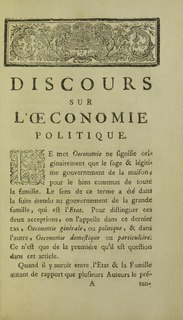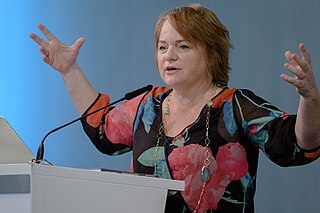Political science is the scientific study of politics. It is a social science dealing with systems of governance and power, and the analysis of political activities, political thought, political behavior, and associated constitutions and laws.

Political economy is the study of production and trade and their relations with law, custom and government; and with the distribution of national income and wealth. As a discipline, political economy originated in moral philosophy, in the 18th century, to explore the administration of states' wealth, with "political" signifying the Greek word polity and "economy" signifying the Greek word οἰκονομία. The earliest works of political economy are usually attributed to the British scholars Adam Smith, Thomas Malthus, and David Ricardo, although they were preceded by the work of the French physiocrats, such as François Quesnay (1694–1774) and Anne-Robert-Jacques Turgot (1727–1781). There is also a tradition which is almost as long, of critique of political economy.

Public administration is the implementation of public policy, administration of government establishment, management of non-profit establishment and also an academic discipline that studies this implementation and prepares civil servants specially for administrative purpose for working in the government and non profit sector. As a "field of inquiry with a diverse scope" whose fundamental goal is to "advance management and policies so that government can function." Some of the various definitions which have been offered for the term are: "the management of public programs"; the "translation of politics into the reality that citizens see every day"; and "the study of government decision making, the analysis of the policies themselves, the various inputs that have produced them, and the inputs necessary to produce alternative policies." The word public administration is the combination of two words—public and administration. In every sphere of social, economic and political life there is administration which means that for the proper functioning of the organization or institution it must be properly ruled or managed and from this concept emerges the idea of administration.
John McCormick is Jean Monnet Chair of European Union Politics at Indiana University – Purdue University Indianapolis (IUPUI), and was department chair from 2001 until 2008. He spent eight years working in the environmental movement before becoming an academic. His research and teaching interests have moved from environmental policy to comparative politics and the politics and policies of the European Union.

Frank Schimmelfennig is a professor of European politics at the Center for Comparative and International Studies at the Swiss Federal Institute of Technology in Zurich, Switzerland.
Manfred G. Schmidt is professor of political science at the Faculty of Economic and Social Sciences of the University of Heidelberg.

Kalypso Aude Nicolaïdis is a Greek/French academic, currently Professor of International Relations and Director of the Center for International Studies at Oxford University, England. She teaches in the areas of European integration, international relations, international political economy, negotiation and game theory and research methods as University Lecturer in the Department of Politics and International Relations. In 2020, Nicolaïdis joined the School of Transnational Governance at the European University Institute as a full time professor.
Ruth Wodak is an Austrian linguist, who is Emeritus Distinguished Professor and Chair in Discourse Studies in the Department of Linguistics and English Language at Lancaster University and Professor in Linguistics at the University of Vienna.
European Political Science (EPS) is a peer-reviewed academic journal. The professional journal of the European Consortium for Political Research (ECPR), it has been published in collaboration with Palgrave Macmillan since 2005. The journal's interpretation of 'political science' is wide, and encompasses comparative politics, political economy, international relations, public administration, political theory, European studies and related disciplines. It publishes pieces on how the discipline is, can be and ought to be. Articles address research matters ; professional matters ; doctoral training provision and teaching matters; and relations between academics and politicians, policy-makers, journalists and ordinary citizens. EPS also includes more substantive pieces that provide a political science perspective on important current events. In addition to original articles, the journal carries shorter notes, review articles and symposia, progress reports on lively areas of research and profiles of people in the profession. Each issue of EPS also contains book reviews.

European Union Politics (EUP) is a peer-reviewed academic journal for research and scholarship on the processes of government, politics and policy in the European Union. The journal was established in 2000. Its founding editor, Gerald Schneider, continues to serve as the Executive Editor. EUP is published on a quarterly basis in March, June, September and December by Sage Publications.
Peter Frederick Taylor-Gooby has been Professor of Social Policy at the University of Kent since 1990.

The German University of Administrative Sciences Speyer, is a national graduate school for administrative sciences and public management located in Speyer, Rhineland-Palatinate, Germany. Founded in 1947 by the French occupational authorities as a grande école, today it is operated under the joint responsibility of both the Federal Republic (Bund) and all 16 German states (Länder). It runs four Master's programs, grants doctoral degrees and habilitations, offers a postgraduate certificate program, and administers programs of executive education. The school is a major training ground for German and international senior government officials. Noted alumni and faculty include former President of Germany Roman Herzog, Professor Niklas Luhmann; current Minister of Justice Christine Lambrecht, former President of the Bundesbank Helmut Schlesinger, former Prosecutor General of Germany Alexander von Stahl, and CEO of BASF Jürgen Strube.

The Willy Brandt School of Public Policy is a public institute for research and education in the field of public policy at the University of Erfurt. It was established in 2002, offering the first German study program leading to a Master of Public Policy (MPP) degree. The program has been accredited and reaccredited by ACQUIN. The working language is English. Until November 2009, the school was named Erfurt School of Public Policy (ESPP).
Tanja A. Börzel is a German Political scientist. Her research and teaching focus on the fields of European Integration, Governance, and Diffusion. She is professor of Political Science at the Otto-Suhr-Institute of Political Science of Freie Universität Berlin, director of the Center for European Integration, and holder of the Jean Monnet Chair for European Integration from 2006 until 2009. Currently, she is department chair of the Otto-Suhr-Institute of Political Science.

Brigitte Young, is Professor Emeritus of International political economy at the Institute of Political Science, University of Münster, Germany. Her research areas include economic globalization, global governance, feminist economics, international trade, global financial market governance and monetary policy. She has worked on EU-US financial regulatory frameworks, European economic and monetary integration and heterodox economic theories. She is the author of many journal articles and books in English and German on the Global financial crisis of 2008–2009, the US Subprime mortgage crisis, the European sovereign-debt crisis, and the role of Germany and France in resolving the Euro crisis.

Eugénia da Conceição-Heldt is a Portuguese-German political scientist, the reform rector of the Bavarian School of Public Policy at the Technical University of Munich and the founding dean of the TUM School of Governance. She is known for her research on the delegation of power to international organizations, European integration, global economic governance, two-level games theory, international negotiation analysis, as well as power and accountability in global governance.
Diane L. Stone is an Australian-British academic.
Ellen Margaretha Immergut is a political scientist known for her work on electoral and political competition on welfare state reforms, policy analysis, health politics in Europe, and the impact of right-wing populism on social policies.
Katharina Holzinger is a German political scientist with a focus on international politics. Since 2021, she is the Rector of the University of Konstanz.








